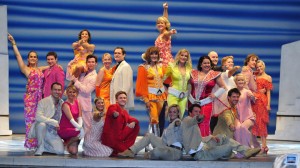The stage musical “Mamma Mia!”, which opened in 1999 at London’s West End, and which has been touring the world—and currently running at the Cultural Center of the Philippines until February 19—would not have been mounted without the direct participation of ABBA’s founding members and songwriters, Benny Andersson and Bjorn Ulvaeus.
Initially, the guys were reportedly “not enthusiastic” about the idea that ABBA’s songs could form the material for a theatrical production. But in this e-mail interview with the Inquirer, Bjorn— who was also
ABBA’s guitarist—said he was convinced that “Mamma Mia!” was worth doing after he and Benny met British playwright Catherine Johnson, who was commissioned to write the book for the musical.
You were a member of the Swedish “folk-schlager” band Hootenanny Singers before you met Benny. Please tell us what “schlager” sounds like.
Schlager is “hit” in German. It’s a catchy type of tune peculiar to northern Europe, with traditions from Italian and French ballads and European melody in general. As you may have gathered, it’s very hard to describe, but you’ll know it when you hear it.
Who were your first guitar idols or influences, and what specific qualities did you like about them?
Elvis Presley was first and then came The Everly Brothers and pop acts from America. I also listened to American folk music, Kingston Trio and others. Then came The Beatles. I’ve always liked strong melodies and American pop tunes in the late 1950s certainly had that.
What did you appreciate most about writing songs with Benny?
The fact that he seems to be an endless source of good melodies.
How was the ABBA sound crafted? Benny said the Beach Boys records were a big influence. And Michael Tretow mentioned that you and Benny wanted some sort of “wall of sound” to back up the already unique double-vocals of Anna and Frida.
We listened to everything that was happening and whatever caught our fancy we would try in the studio. The “wall of sound” was Phil Spector’s invention, but we imitated that as well. That’s what pop music is about: Listen to what’s going on around you, try out whatever influences you can get, and see if they work for you.
“Dancing Queen” is said to be the band’s signature song and the only No. 1 US hit in ABBA’s career. Was it written as a response to the disco trend at that time, the mid-’70s, because it was said that the song’s rhythm was partly inspired by George McCrae’s “Rock Your Baby”?
Can’t remember.
You were initially hesitant to get involved in “Mamma Mia!” when it was first discussed. What convinced you that it was worth doing?
As a full-fledged musical it was discussed sometime in the late ’90s, and I was convinced it was worth doing when we met Catherine Johnson.
What were your specific inputs in the story and how were the songs chosen?
Catherine wrote the story and we discussed every draft of the script she came up with (at least five, I think), and changed the songs and story line a little each time.
The musical is about romance, filial ties and resolving past hurts, which you and Benny have experienced in your personal lives. Do you think your respective marriages would have survived if you didn’t become superstars?
No, I don’t think so, not in Agnetha’s and my case.
You were proficient in writing about songs that combined sad, happy or bittersweet moments like in “S.O.S.,” “Knowing Me, Knowing You,” and “Mamma Mia” itself, or even “The Winner Takes It All.” Did it take a lot of emotional catharsis to finish those songs, or were you simply using your powers of imagination as writers?
We used the immense power of imagination that we possessed. There was nothing impossible with us.
